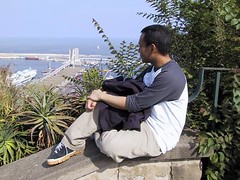In his book, the 7 habits of highly effective people, Stephen Covey dully define the word responsibility as "response+ability" or the ability to respond. Through the first habit, 'be proactive', Covey actually define the 'ability to respond' based solely on one's principles and not based outside factors. This is especially importat when we consider emotion: the emotion you are feeling right now, are they set purposely by you or by some outside factor? Can you "decide" to feel something despite of what's happening to you? Can you decide to feel "strong" despite being pounded to death?
Here's the story of one of the companion of the prophet (I think it was Ali, but not sure). It was in one of the battles in the early days of Islam (yup, if you bring something revolutionary, people will want to wage war on you). This companion of the prophet was fighting an enemy from the other side. He managed to subdue his enemy and the enemy felt down. Just before he was about to strike the final blow, the enemy spat on his face... and suddenly he stopped. When asked why didn't he delivered the final blow, he said "The enemy was waging a war towards Islam and I was there to protect my religion, when the enemy spat on me, he actually despised me, not Islam, it would be wrong for me to kill him"
A weaker man would have striked that final blow, it takes strong man to always evaluate one's inner principle and to take appropriate action (I.E. being able to respond appropriately - being responsible) according to that principle [of course, for muslims, the principle here would be Islam], not because you are caught up in some emotional momentum.
See how the prophet hone the sense of responsibility in his companions such that they would always, at all times, before any action, evaluate what response their principle requires and act in accordance with it. The question is how always is 'always'? I think the more frequent this evaluation is done, the closer a muslim to be a true muslim -- to reach taqwa.
I think it was Abu Bakr, another companion of the prophet, who said that taqwa is like walking in an alley full of thorns, you be very careful where you would step on. It is not too far fetched, I think, to relate Covey's first habit, 'be proactive' with taqwa (think of taqwa as a special version {Islamisiced, if I can say that} of being proactive).
Here's the story of one of the companion of the prophet (I think it was Ali, but not sure). It was in one of the battles in the early days of Islam (yup, if you bring something revolutionary, people will want to wage war on you). This companion of the prophet was fighting an enemy from the other side. He managed to subdue his enemy and the enemy felt down. Just before he was about to strike the final blow, the enemy spat on his face... and suddenly he stopped. When asked why didn't he delivered the final blow, he said "The enemy was waging a war towards Islam and I was there to protect my religion, when the enemy spat on me, he actually despised me, not Islam, it would be wrong for me to kill him"
A weaker man would have striked that final blow, it takes strong man to always evaluate one's inner principle and to take appropriate action (I.E. being able to respond appropriately - being responsible) according to that principle [of course, for muslims, the principle here would be Islam], not because you are caught up in some emotional momentum.
See how the prophet hone the sense of responsibility in his companions such that they would always, at all times, before any action, evaluate what response their principle requires and act in accordance with it. The question is how always is 'always'? I think the more frequent this evaluation is done, the closer a muslim to be a true muslim -- to reach taqwa.
I think it was Abu Bakr, another companion of the prophet, who said that taqwa is like walking in an alley full of thorns, you be very careful where you would step on. It is not too far fetched, I think, to relate Covey's first habit, 'be proactive' with taqwa (think of taqwa as a special version {Islamisiced, if I can say that} of being proactive).


No comments:
Post a Comment